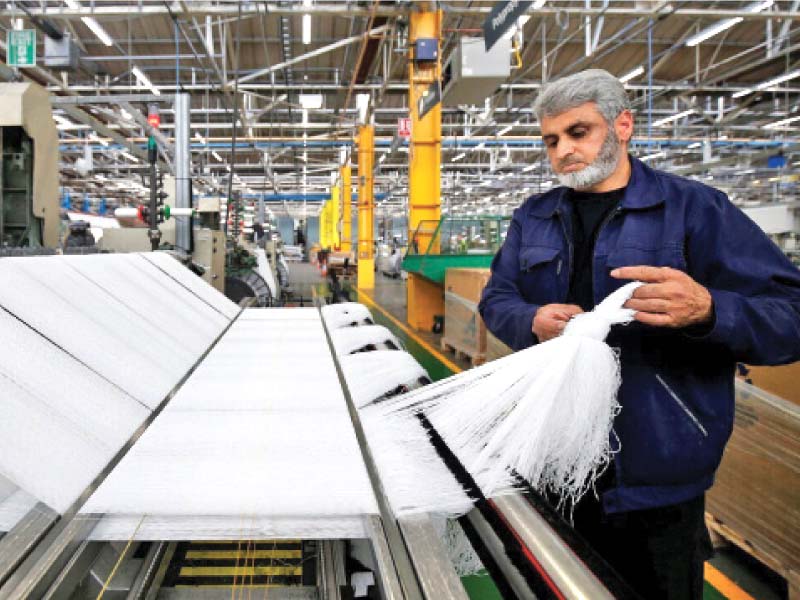
Textile lobbies have high hopes that Prime Minister Imran Khan will announce additional incentives for the textile sector during his scheduled visit to Sialkot on December 9.
The sector has restored its operations to full capacity since the government announced a reduction in cotton import cost coupled with a drop in electricity rates.
Industrialists are receiving hefty export orders as international buyers are approaching Pakistani businessmen because production activities are facing disruption in neighbouring countries due to the global pandemic.
The performance of textile sector has been satisfactory which can be judged from the fact that in first five months of fiscal year 2020-21, the country’s exports reached $9.732 billion against $9.545 billion in the corresponding period of previous year. A massive chunk of that comprised exports from the textile sector.
Stakeholders of the sector now wish for swift resolution of their issues so that shortage of raw material, lack of innovation and overhaul of the entire supply chain could be addressed.
“There is a dire need to enhance cotton production in the country so that it could at least meet domestic requirement and promote the textile industry,” said Pakistan Hosiery Manufacturers and Exporters Association Chief Coordinator Adil Butt.
In his comments to The Express Tribune, he held the view that if achieved it would lend support to export of value-added textile products, economic activities and employment opportunities while saving foreign exchange.
He pointed out that the government was striving to meet requirements of the value-added knitwear sector by eliminating taxes and duties on the import of cotton yarn to reduce its production cost.
“Now, it is the responsibility of the textile spinning industry to upgrade its technology, improve standards in line with international practices and raise its efficiency level to compete effectively in the domestic as well as international markets,” he said.
According to the stakeholders, the value-added knitwear industry is receiving a large number of export orders, however, traders have been unable to confirm them due to unavailability of cotton yarn in the country at competitive prices.
At present, there are around 1,200 ginning factories in the country, out of which 250 are in Sindh, over 720 in Punjab and the remaining in other parts of the country.
They added that the sector was not only contributing an 8.5% share to the gross domestic product (GDP) but was also providing employment to 40% of the labour force.
Around 511 spinning mills are operating across the country, most of which are in Punjab and Sindh, and have 13.4 million spindles and 199,000 rotors. This industry is mainly focusing on spinning coarse and medium fineness yarn.
“We appreciate that with a view to facilitating exports, Prime Minister Imran Khan has already approved the formation of National Export Development Board,” said Pakistan Readymade Garments Manufacturers and Exporters Association Central Chairman Sohail Sheikh.
He pointed out that the board would be headed by the prime minister himself under the Strategic Trade Policy Framework 2020-25 and hold meetings every month in which all issues related to Pakistan’s exports would be discussed.
“However, we demand that the government take small and medium enterprises (SMEs) on board as well because they are the backbone of economy and represent more than 90% of the industry,” he added.
Pakistan Businesses Forum President Mian Usman Zulfiqar urged the government to make it compulsory for large spinning units, having more than 30,000 spindles, to grow their own cotton for yarn manufacturing.
Stating the reason behind the proposal, he said textile exports could not be enhanced without increasing the area under cotton cultivation as well as yield of the crop.
According to him, there is a dire need for upgrade of the textile sector to improve and enhance its productivity.
“Formulation of new strategies and programmes are imperative to enable this sector to combat challenges and compete in the global market,” Zulfiqar added.
He said 80% units of the textile industry belonged to the SME sector, however, the segment was encountering many problems such as lack of research and development facilities.
“These problems are increasing the cost of doing business while rival regional countries like India and Bangladesh are producing cheap products,” he said. “Tough competition in the international market is also hampering the growth of textile industry in Pakistan in the longer term.”
On the other hand, the unwillingness of small unit owners to innovate is also a big problem for the textile industry.
“Experts keep introducing new ideas and products for the textile industry but unfortunately industrialists are not showing much interest in adopting new ideas,” he added.
Published in The Express Tribune, December 4th, 2020.
Like Business on Facebook, follow @TribuneBiz on Twitter to stay informed and join in the conversation.


















COMMENTS
Comments are moderated and generally will be posted if they are on-topic and not abusive.
For more information, please see our Comments FAQ